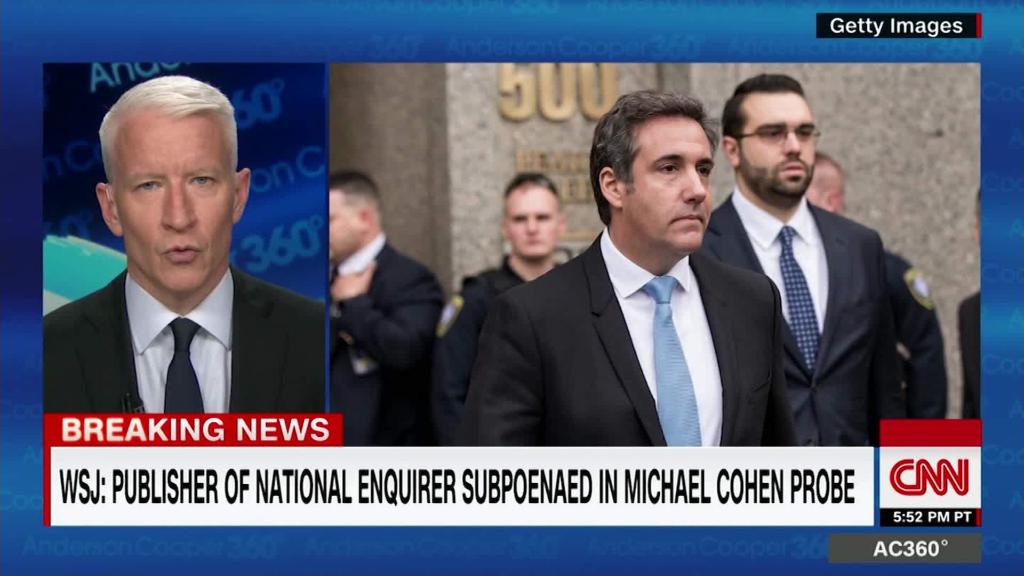
The National Enquirer's partnership with the Trump campaign was even more extensive than previously reported.
Michael Cohen's guilty plea on Tuesday revealed that the plot to "catch and kill" stories was hatched way back in August 2015, just two months after Trump entered the race.
Now there are new questions about the Enquirer's legal exposure.
For more than a year, unbeknownst to the tabloid's readers or the public, Cohen worked with the Enquirer's owner, American Media Inc., to bury stories that could have harmed Trump's chances of winning the presidential election.
While this tactic was exposed by news outlets months ago, it was described in new detail on Tuesday. And for the first time, Cohen fessed up to it. In court, he admitted that his hush money payments were illegal, and were done "for the principal purpose of influencing the election."
In the government's filings, American Media Inc. is only described as a media company that owns a tabloid, and its chairman and CEO David Pecker is only identified through his titles.
Cohen said in court that "I and the CEO of a media company, at the request of the candidate, worked together" to squelch stories.
Media companies, of course, are usually in the business of publishing bombshell stories, not covering them up. But the National Enquirer operates differently. Trump and Pecker have had a mutually beneficial relationship for years. Buying the rights to a potentially harmful story and then burying it as a favor -- a tabloid practice called "catch and kill"-- was one of the benefits.
Pecker has not been charged with a crime. But Pecker and American Media Inc. are part of an ongoing federal inquiry. The Wall Street Journal reported in June that Pecker and the company's chief content officer, Dylan Howard, were subpoenaed earlier in the year.
A spokesman for the company did not respond to multiple requests for comment about Cohen's guilty plea.
Related: Who is 'our friend David?' Meet tabloid king David Pecker
Others may be implicated, as well. According to the court filing, Pecker "offered to help deal with negative stories" about Trump's relationships with women "by, among other things, assisting the campaign in identifying such stories so they could be purchased and their publication avoided."
The filing also said Pecker coordinated this with both Cohen and "one or more members of the campaign." Those campaign staffers, however, were not named.
The court filing does not say how many stories were buried by the National Enquirer's parent company. But it said that Pecker advised Cohen "of negative stories during the course of the campaign."
And "Cohen, with the assistance of Corporation-1," meaning American Media Inc., "was able to arrange for the purchase of two stories so as to suppress them and prevent them from influencing the election."
Those two stories involved former Playboy model Karen McDougal and adult film star Stormy Daniels.
Related: 'Catch and kill': How a tabloid shields Trump from troublesome stories
On Tuesday Cohen pleaded guilty to campaign finance violations tied to the payments made to the women. One of the payments was made through a contract between McDougal and American Media, ostensibly for McDougal to produce content for the company's magazines.
The Journal first wrote about the contract in a story a few days before the 2016 election. The article was titled "National Enquirer Shielded Donald Trump From Playboy Model's Affair Allegation." At the time, the Enquirer claimed that "AMI has not paid people to kill damaging stories about Mr. Trump."
Now Cohen is admitting that AMI did just that.
Tuesday's charges by the U.S. attorney in the Southern District of New York are backed up by information seized from Cohen earlier this year.
One of Cohen's own tape recordings of his conversations with Trump, which his legal team shared with CNN last month, also corroborated his account.
"Um," Cohen was heard saying to Trump, "I need to open up a company for the transfer of all of that info regarding our friend David."
This "friend" could have been David Pecker.
"So what are we goncna pay--" Trump asked. "Yes, um, and it's all the stuff," Cohen said. "All the stuff, all the stuff because you never know where that company -- you never know where he's gonna be." What if, Trump suggested, Pecker "gets hit by a truck?" Meaning, what if his friend is no longer in charge of the company that owns some of his secrets? "Correct," Cohen said, "so I'm all over that."
Investigations of media companies typically provoke First Amendment concerns. But this is an unusual case, to say the least. Last month The New York Times reported that federal investigators have concluded that AMI "at times acted more as a political supporter than as a news organization."
Related: Former AMI editor describes 'favor bank' of killed Trump stories
"If Mr. Pecker and his company acted as is alleged, there should and very likely would be no viable First Amendment defense for them," veteran First Amendment attorney Floyd Abrams told CNN on Wednesday. "To be sure, publications make editorial decisions as to what to publish or not, but if it is true that as a matter of personal or corporate policy stories were purchased for the purpose of killing them to benefit a candidate for office, the First Amendment would not come into play."
"It is therefore possible that the US could commence some sort of action against Mr. Pecker and/or American Media -- which it has not yet done," Abrams added. "Of course, Mr. Pecker may deny the accuracy of the assertion about him and American Media and if he does that determination of what the truth is -- whatever Rudy Giuliani may say to the contrary -- is what the courts exist to decide."


